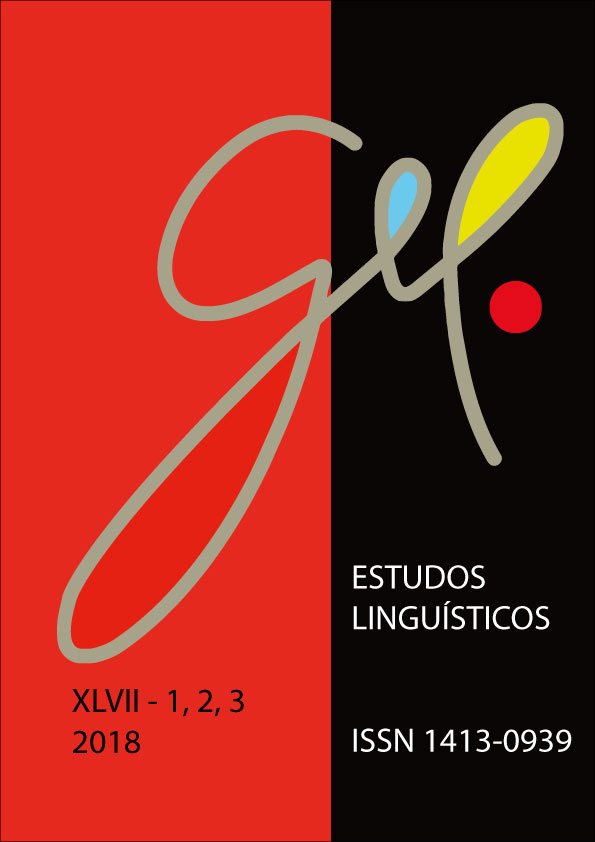Poetic lucidity in Ave, Palavra, by Guimarães Rosa
DOI:
https://doi.org/10.21165/el.v47i3.1954Keywords:
modern poetry, Guimarães Rosa, convergence poetryAbstract
This paper proposes an analysis of the poetic compositions written by João Guimarães Rosa published in his hybrid book Ave, Palavra (1970). We start from the perspective that his poems are based on what Octavio Paz (1993) called “poesia de convergência”, inheritance of the dialogue between two extremes arising from romantic production: analogy and irony. Taking into account the tendency as irony, we highlight among the author's productions four compositions that promote the exploration of literary creation. As a method of analysis, approximations of the poems will be made with other works and other texts which probe the literary work, such as the interview given by the artist to Günter Lorenz (1973), the correspondence exchanged with his Italian translator Edoardo Bizzarri (1980) and sections of prefaces of Tutameia (ROSA, 1976). The reading, therefore, seeks to analyze how such disturbing questions perform in his poems, sometimes from embryonic narratives, allegorical, sometimes using compositions with a more lyrical tone, bringing to the surface recurrent images in their productions, evidencing that his poetry is not just an accident, but it composes the aesthetic project of the author.Downloads
References
ARAUJO, H. V. de. O espelho: contribuição ao estudo de Guimarães Rosa. São Paulo: Mandarim, 1998.
BIZZARRI, E. J. Guimarães Rosa: correspondência com seu tradutor italiano Edoardo Bizzarri. 2. ed. São Paulo: T. A. Queiroz, Instituto Cultural Ítalo-Brasileiro, 1980. (Biblioteca de Letras e Ciências Humanas, série 1: Estudos Brasileiros, 2).
COELHO, N. N. Guimarães Rosa e a tendência regionalista. In: ÁVILA, A. (Org.). O Modernismo. São Paulo: Perspectiva, 1975. p. 203-211.
COUTINHO, E. Guimarães Rosa e o processo de revitalização da linguagem. In: COUTINHO, E. (Org.). Guimarães Rosa. Rio de Janeiro: Civilização Brasileira/ INL, 1991. p. 202-234. (Fortuna crítica).
FANTINI, M. Guimarães Rosa: fronteiras, margens, passagens. São Paulo: Ateliê Editorial, 2004.
FERREIRA, A. B. de H. Novo dicionário Aurélio da língua portuguesa. 3. ed. Curitiba: Positivo, 2004.
LEONEL, M. C. Guimarães Rosa: Magma e gênese da obra. São Paulo: Editora UNESP, 2000.
LEVY, T. S. A experiência do Fora: Blanchot, Foucault e Deleuze. Rio de Janeiro: Dumará, 2003.
LORENZ, G. W. Guimarães Rosa. In: LORENZ, G. W. Diálogo com a América Latina: panorama de uma literatura do futuro. Tradução de R. C. Abílio e F. de S. Rodrigues. São Paulo: E. P. V., 1973.
MACIEL, M. E. Poéticas da lucidez. In: MACIEL, M. E. Vôo transverso: poesia, modernidade e fim do século XX. RJ/ BH: Sette Letras, FALE-UFMG, 1999.
NUNES, B. Guimarães Rosa. In: NUNES, B. O dorso do tigre. São Paulo: Perspectiva, 1969. p. 143-210.
PAZ, O. A outra voz. Tradução de W. Dupont. São Paulo: Siciliano, 1993.
PAZ, O. O arco e a lira. Tradução de O. Savary. Rio de Janeiro: Nova Fronteira, 1982.
ROSA, J. G. Ave, palavra. Rio de Janeiro: J. Olympio, 1970.
ROSA, J. G. Tutameia (terceiras estórias). Rio de Janeiro: J. Olympio, 1976.



